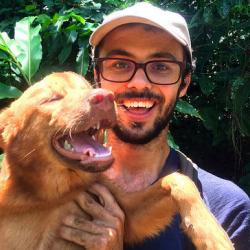Biography
I completed an integrated Master's at the University of Sheffield (2014-18) under Professor David Edwards, focused on how post-logging interventions can be used to restore multiple values in selectively logged landscapes. My Master's project focused on the effects of vine-cutting and enrichment planting on dung beetle recovery in heavily logged forests in Borneo.
In 2019, I came to Cambridge and was awarded a Peter Scott Studentship from Trinity College. My PhD - the biodiversity and climate impacts of alternative approaches to meeting demands for tropical timber and forest restoration - was completed in 2024 under the supervision of Professor Andrew Balmford.
Research
I am a conservation scientist interested in how to meet future wood demands at the least cost to the planet. Much of my research considers how to navigate trade-offs between biodiversity, climate and economic objectives. To do this, I combine detailed field surveys, datasets and ecological theory with landscape-level modelling. I am particularly interested in how conservationists can assess the outcomes of alternative production approaches and I care deeply about how science can be used to influence landscape-scale management practices and reduce species extinction risk. Currently, I am quantifying the biodiversity and climate outcomes of alternative ways of meeting global wood demand, both in Oregon and around the world. I am happiest when walking along ridgelines in old-growth forests.
Publications
Cerullo, GR, Edwards, DP, Actively restoring resilience in selectively logged tropical forests. J Appl Ecol. 2019; 56: 107– 118. https://doi.org/10.1111/1365-2664.13262
Cerullo, GR, Edwards, FA, Mills SC, Edwards, DP.Tropical forest subjected to intensive post-logging silviculture maintains functionally diverse dung beetle communities, Forest Ecology and Management. 2019: 444: 318-326,
https://doi.org/10.1016/j.foreco.2019.04.025.
Bousfield, CG, Cerullo, GR, Massam, MR, Edwards, DP. Protecting environmental and socio-economic values of selectively logged tropical forests in the Anthropocene. Advances in Ecological Research, 2020: 10.1016/bs.aecr.2020.01.006

